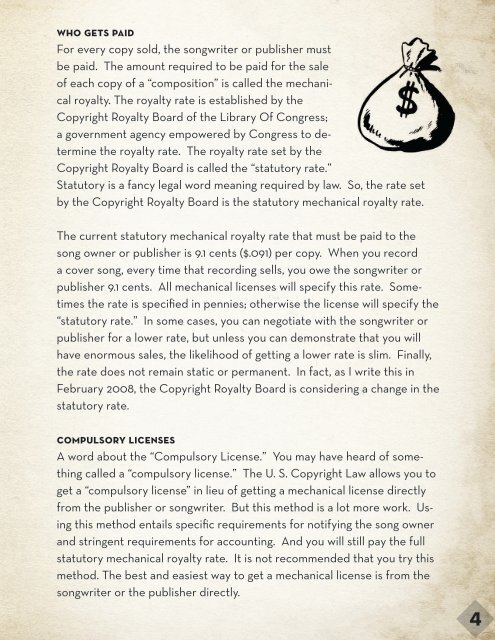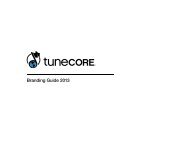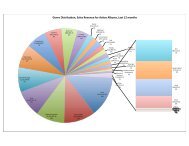Music Publishing and Copyright: Cover Songs - TuneCore
Music Publishing and Copyright: Cover Songs - TuneCore
Music Publishing and Copyright: Cover Songs - TuneCore
You also want an ePaper? Increase the reach of your titles
YUMPU automatically turns print PDFs into web optimized ePapers that Google loves.
who gets paid<br />
For every copy sold, the songwriter or publisher must<br />
be paid. The amount required to be paid for the sale<br />
of each copy of a “composition” is called the mechanical<br />
royalty. The royalty rate is established by the<br />
<strong>Copyright</strong> Royalty Board of the Library Of Congress;<br />
a government agency empowered by Congress to determine<br />
the royalty rate. The royalty rate set by the<br />
<strong>Copyright</strong> Royalty Board is called the “statutory rate.”<br />
Statutory is a fancy legal word meaning required by law. So, the rate set<br />
by the <strong>Copyright</strong> Royalty Board is the statutory mechanical royalty rate.<br />
The current statutory mechanical royalty rate that must be paid to the<br />
song owner or publisher is 9.1 cents ($.091) per copy. When you record<br />
a cover song, every time that recording sells, you owe the songwriter or<br />
publisher 9.1 cents. All mechanical licenses will specify this rate. Sometimes<br />
the rate is specified in pennies; otherwise the license will specify the<br />
“statutory rate.” In some cases, you can negotiate with the songwriter or<br />
publisher for a lower rate, but unless you can demonstrate that you will<br />
have enormous sales, the likelihood of getting a lower rate is slim. Finally,<br />
the rate does not remain static or permanent. In fact, as I write this in<br />
February 2008, the <strong>Copyright</strong> Royalty Board is considering a change in the<br />
statutory rate.<br />
compulsory licenses<br />
A word about the “Compulsory License.” You may have heard of something<br />
called a “compulsory license.” The U. S. <strong>Copyright</strong> Law allows you to<br />
get a “compulsory license” in lieu of getting a mechanical license directly<br />
from the publisher or songwriter. But this method is a lot more work. Using<br />
this method entails specific requirements for notifying the song owner<br />
<strong>and</strong> stringent requirements for accounting. And you will still pay the full<br />
statutory mechanical royalty rate. It is not recommended that you try this<br />
method. The best <strong>and</strong> easiest way to get a mechanical license is from the<br />
songwriter or the publisher directly.<br />
4






